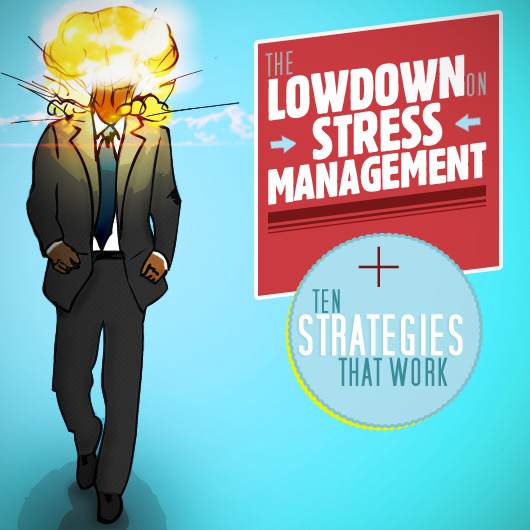Men aren’t exactly the best stress managers in the world. Guys manage or cope with the stress that finds its way into their lives, but often just keeps building up. Relationship stress, work stress, family stress and personal stress all chip away our foundation over time, and the fractures start to show. Physical problems arise, or a general sense of depletion and fatigue sets in. It becomes harder and harder to function at peak levels, and we all strive for optimal performance, don’t we?
Overall, men can be doing a better job of taking care of themselves, and developing a good stress management program is the critical first step. Stress affects so many different things in our lives, from work to relationships, and it’s a wonder how simple, effective stress management eludes so many busy Americans. Unfortunately, the way we’ve exacerbated stress is by over-caffeinating ourselves, losing precious sleep, working around the clock and not creating downtime for rest and relaxation. We’re burning the candle at both ends, and trying to function from there.
There are a lot of angles to stress.
First, it’s important to distinguish that there is a difference between good and bad stress. We all need a little bit of good stress to stay motivated and keep on course, but when we get overloaded, that’s when the trouble happens. That’s where the bad stress comes in. With bad stress, we fatigue our adrenals, and end up tired, irritable and exhausted. Our bodies are depleted, our minds function poorly, and our energy is so tied up to feeding the stress or the stressful situations that it’s just not available for all the other things we need that energy for. We’re energetically bankrupt.
Persistent fatigue is directly related to stress. Not everyone deals with stress the same way, and there are certainly people that are more sensitive to stress. Emotions from stress consume a lot of one’s store of personal energy, so learning to deal more effectively with emotions proves to be a very effective stress reducer. For men, this is a big deal, because so many men have a hard time dealing with their emotions in a healthy way.
For guys, the all-encompassing term “stress” may blanket several different experiences: from feeling the effects of physical stress or tension, to talking about emotionally-based issues. Many men, unable to name their emotions, name their emotional or psychological suffering as “stress,” because it’s the most convenient or socially-appropriate label. If there are mental health issues guys are suffering from, be it depression, anxiety, or worry, it’s much more socially acceptable to say “I’m stressed,” than it is to admit there’s a potential emotional or psychological problem.
For men, anger is also directly related to stress.
It’s hard to put our finger on when we’re stressed, or if we’re really frustrated or angry. For a lot of men who don’t see themselves as being angry or as angry people, we default to “being stressed” or “pissed” or “irritable”. Plenty of stressed out guys simply explode in anger, or shut down emotionally and cut off from others who care. Deal with the anger, and you can start dealing with the stress, too.
Stress can also directly affect our intimate relationships. If we can’t take care of ourselves, we leave it up to others to do it, and it usually breeds contempt and guilt in our partners. Women do a much better job of understanding their stress levels, and dealing with them accordingly. But, women can get into trying to take care of their own stress levels, and their guy’s, at the same time, which affects the whole relationship in a negative way. I talk with plenty of men whose wives generally know more about their stress than they do about their own. Women are left to take care of men when men don’t, and women hide their anger and frustration through guilt by having to also caretake their partner. Helping our stress is helping our partner’s stress, too.
Here are ten foolproof stress management techniques you can start to use today:
- Not overworking to the point of exhaustion. Ask yourself, “Are there parts of work I can do less of for my own health and happiness?”
- Eat right: There are foods that will aggravate stress, and foods that will sedate stress. Try cutting down or quitting caffeinated and sugary drinks and foods that increase stress levels. Try eating more lean meats and fish, and vegetables and fruits.
- Getting daily exercise: This is a tough one, because it’s really hard to make a regular schedule to exercise and get to the gym. It can be work in itself. This is a lifestyle change, not an instantaneous “hit the gym once in a while” thing, so pace yourself. Stress happens over time, and your stress combat plan should develop over the long term.
- Practice relaxation: Yoga, meditation, even mindful breathing are all superior techniques to help reduce stress.
- Network development: Many times, guys don’t have anyone to talk to. They might not talk with their other male friends, and their wife or girlfriend may be stressed in her own way. Making the outlet to talk and creating a support network is essential to stress management. Without it, we end up stuffing stress, letting it fester and building it up over time to create much worse problems.
- Develop routines: stress is a part of everyday life, and those that have the plans most easily executed will come out on top of their stress. See the lifestyle changes you’re making as integral to your lifestyle, not a temporary thing or fad. If you set your sights on stress management as a high value for you, you’ll start to choose behaviors that reflect that value.
- Practice positive psychology: Thinking positively – while hard for some – trains your brain to see things through a different scope. Choose optimism over negativity.
- Reduce alcohol consumption: Alcohol is a depressant, and it also affects your sleep by increasing the body’s stress hormone epinephrine, which stimulates heart rate and stress. Alcohol, in moderation, can take the ease off stress, but, for the long term, it’s not the best solution.
- Say ‘no’ more: Too many guys are just as guilty of not saying ‘no’ as their female counterparts. When we can’t say ‘no’, we guilt ourselves into accepting more and more from others, whether that’s doing favors, taking on more work, or generally stuffing our own need to do less. Learn to take on less responsibility, and learn to say ‘no’ – the world won’t end if you do.
- Manage your time: The inability to manage time erodes our foundation to deal with stress. Not being able to deal efficiently with all that’s thrown at us in a day can shut your whole machine down quickly. Learn to manage your time, and you’ll immediately experience better stress reduction. Use lists, calendars, and your phone. Plan commuting times, cook on Sundays for the week’s worth of lunches, and generally start to visualize your upcoming week, so that you can do what you need to do before it needs to be done.
Stress requires a long-term battle plan, and doing one or two of these strategies should start to show benefits quickly. Living an optimized life starts with a solid stress management plan.
















